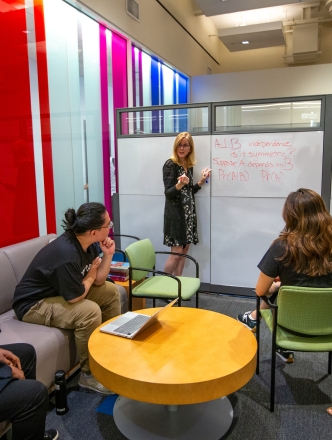
Still Accepting Applications
In this 34-to-43-credit program, you will learn the foundations and machinery underlying advanced statistics and data science techniques, apply these methods to critical applications across the social, behavioral, and health sciences, and translate research findings and their implications to outside audiences. This will prepare you for a career as an applied statistician or data scientist or for doctoral study in a range of fields.
Core Course Sequence
The MS in Applied Statistics for Social Science Research (A3SR) core curriculum features coursework in foundational material in probability, inference, and programming as well as experience in using key tools such as regression modeling, machine learning, causal inference, cleaning messy data, and databases. There is also a focus on understanding when these methods are appropriate and the assumptions that are required for valid inference. You can also explore related topics such as ethics, translation, and measurement. If you have prior advanced course work we offer an accelerated option allowing you to place out of some introductory courses.
Concentrations
The A3SR program allows you to choose from four different concentrations.
The Computational Methods concentration provides rigorous training in methodological theory, development of methods, algorithms, and designs, and evaluation of the efficacy of those research strategies. It is particularly appropriate if you plan to pursue a PhD in statistics, economics, or computer science.
The Data Science for Social Impact concentration focuses on ethical concerns surrounding data collection and use, collaborations between researchers and practitioners, and challenges involved in succinctly and effectively communicating research findings and their implications. Required classes cover the ethics of data science and translation of data science to non-technical audiences. This concentration will position you to work in a wide variety of careers at the intersection of data and society or a social science doctoral program.
The Measurement, Methodology, and Design concentration prepares students with the skills to ensure data are meaningful, collected appropriately, and analyzed in a way that yields valid, reliable, and actionable insights. Students in this concentration study survey research methods, experimental and quasi-experimental design, and measurement.
The General Applied Statistics concentration is our most versatile concentration, allowing you to customize the program by selecting from a large set of classes in statistics and related fields. Graduates from this track have pursued careers in industry and research, and doctoral programs that are consistent with their course work and internship experiences.
Culminating Experience
Practical experience in applying statistical and data science strategies to address active empirical research projects in academia or beyond is a cornerstone of the program. We work to ensure that you are prepared for the demands of your new career by providing a culminating experience that serves as a training ground for this work.
Consulting
The aim of the statistical consulting seminar is to reinforce key components of the A3SR curriculum and prepare students for work as applied statisticians. Over the course of the semester, you will complete three exams, each covering different aspects of applied statistics. The first exam focuses on regression modeling, statistical inference, probability, and randomized experiments. The second exam emphasizes statistical computing and R programming. The third and final exam covers general topics in applied statistics. Class time is devoted to discussing strategies for identifying the most appropriate tools for a given problem and achieving mastery in applied statistical methods.
Summer Stats Bootcamp
This August, ASH will be offering a math, statistics, and programming bootcamp which will run as a two-week long 0 credit course for NYU graduate students.
Learn More and Register
Take the Next Step
Advance your personal and professional journey – apply to join our community of students.
Apply Now